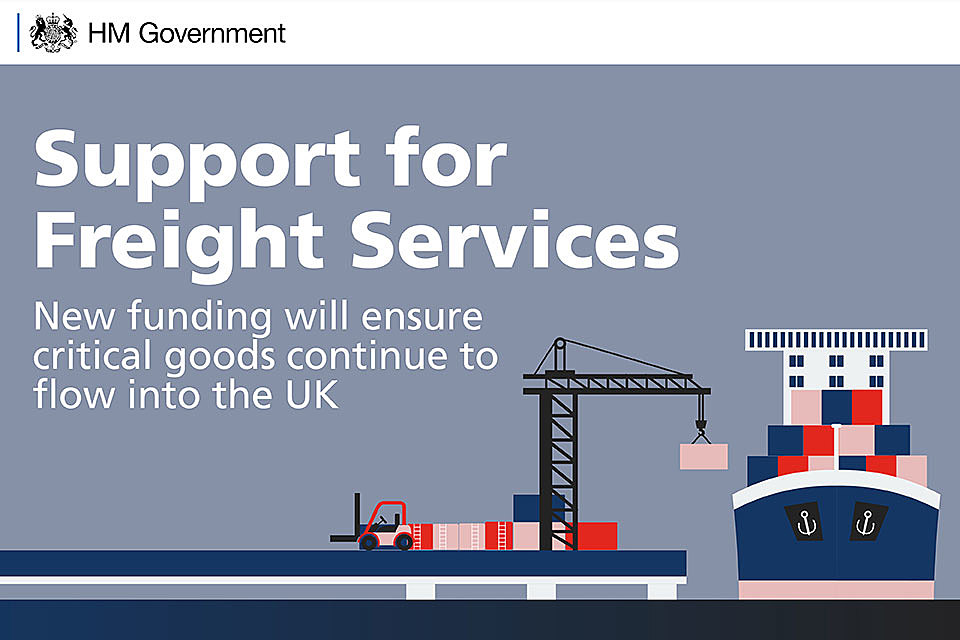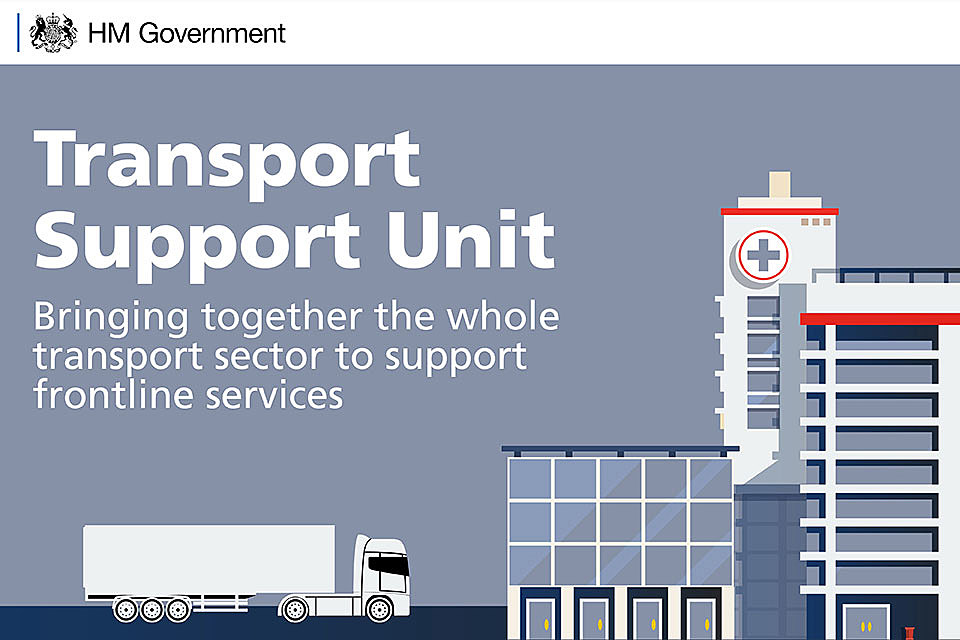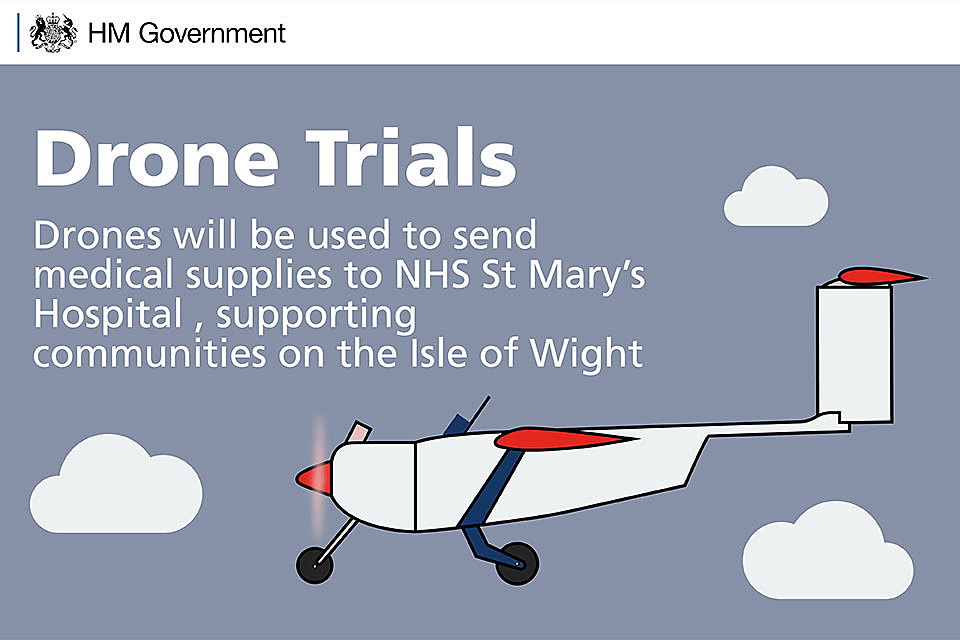Transport Secretary's statement on coronavirus (COVID-19): 24 April 2020
Announcing measures to ensure transport boosts the national response to COVID-19 and paying tribute to the transport workers who have kept vital freight and passenger services running.

This transcript is for the coronavirus statement delivered on 24 April 2020: Coronavirus press conference 24 April 2020.
Opening remarks
Good afternoon, and welcome to today’s Downing Street press conference.
I’m pleased to be joined today by Dr Jenny Harries.
Latest data
Before I talk about the latest steps we are taking to defeat coronavirus, let me update you on the latest information from the COBR data file.
I can report that through the government’s monitoring and testing programme, as of today (24 April 2020)
- 612,031 tests for coronavirus have now been carried out in the UK, including 28,532 tests yesterday
- 143,464 people have tested positive, that’s an increase of 5,386 cases since yesterday
- 17,049 people are currently in hospital with coronavirus in the UK, down from 17,615 on 22 April and down 10% on last week
- and sadly, of those in hospital with the virus, 19,506 have now died - that’s an increase of 684 fatalities since yesterday
We express our deepest condolences to the families and friends of these victims.
We must not forget that each of these statistics represents a personal tragedy.
Transport importance
Despite the continued challenges ahead, as we prepare for the next stage in our battle to beat this pandemic, there are tentative signs we are making progress.
The main reason for that is the way Britain has responded to the guidance to stay at home and maintain social distancing over the past few weeks.
By respecting these measures, the whole country is slowing the spread of the virus. And by avoiding public transport, you’re freeing up space for critical workers who rely on buses and trains to travel safely.
The continued operation of both passenger and freight transport is critically important to our resilience as a country.
So today I’m announcing a new package of measures to ensure transport boosts our national response to COVID-19.
Freight
First, we’re announcing a far-reaching package to safeguard the flow of essential goods into – and across – the country.
I can announce the government has secured a trilateral agreement along with the French and Irish governments which commits our nations to keeping freight routes open throughout the crisis…
Bringing in life-saving medicines, food and many other essential goods…..
Allowing us to meet the needs of our countries during this difficult time.
Operators on many of these routes have been under rising financial pressures due to falling demand.
Since many of them bring in crucial goods like medicines, raw materials and chemicals to purify water, it is important to guarantee the continuation of services.
So, we’re protecting ferry routes between Great Britain and Northern Ireland with funding of up to £17 million.
We’re also taking action to secure services around the United Kingdom, including up to £10.5 million for links to the Isle of Wight and the Scilly Isles, allowing critical freight to continue to support families in every part of our country.
And we’re making sure that air links to Belfast and Derry-Londonderry in Northern Ireland will also continue – these routes are particularly important for critical workers.
Thanks to the measures I’ve announced today, we are safeguarding 5 ferry and 2 air routes between Great Britain and Northern Ireland; and 26 different freight routes between Britain, France, Belgium, Spain, the Netherlands, Denmark, Germany, Norway and Sweden.

Support for freight services: new funding will ensure critical goods continue to flow into the UK.
Transport Support Unit
Second, we have launched a Transport Support Unit (TSU) dedicated to fighting this pandemic.
At the beginning of this crisis we reduced services like rail and buses, whilst securing their continuation to enable critical workers and others to make essential journeys.
Lower ridership means we have spare transport capacity which I have directed to be used for logistical tasks in the fight against this virus.
By making use of the people and the resources of the Department for Transport, its agencies and arm’s length bodies, we will be helping NHS trusts and local resilience groups to fight the pandemic.
We now have over 8,500 specialist volunteers from across the transport sector.
And around 9,000 vehicles which can support the national effort.
This includes 4 fixed-wing aircraft owned by the Maritime and Coastguard Agency (one of them a Boeing 737), helicopters, ships and trains.
Together they will help move emergency patients and medical supplies, deliver personal protective equipment (PPE) to hospitals, and distribute food parcels to vulnerable people.
And vehicles from Highways England will act as mobile COVID-19 testing centres.
Network Rail is also making available its 7 regional distribution centres which can be used to support the effort.
This work is underway and I would like to thank all those taking part, like the Network Rail engineers who helped fit out the Nightingale hospital in Manchester.
As the country works hard to beat this virus, it’s vital we come together and help each other.
So, the Transport Support Unit is getting to work, helping frontline staff, and making full use of the significant resources at its disposal.

Transport Support Unit: bringing together the whole transport sector to support frontline services.
Drones
I have also given the green light to trials of drones delivering medical supplies.
Earlier this year, we awarded £28 million to Southampton and Portsmouth to develop a Future Transport Zone.
As part of that initiative, £8 million was earmarked for testing drones, and how they might be used for delivering goods in the years and decades ahead.
Of course, now we have an urgent need, so we’re making use of that testing programme as part of our response to COVID-19.
As a result, I have fast-tracked trials to begin next week to carry medical supplies and equipment to St Mary’s Hospital, near Newport on the Isle of Wight.

Drone trials: drones will be used to send medical supplies to NHS St Mary's Hospital, supporting communities on the isle of Wight.
Trams
Finally, we have made funding available today to keep England’s trams operating.
This will keep open 5 light rail networks in Greater Manchester, Sheffield, Nottingham, West Midlands and Tyne and Wear….
Allowing essential local routes to remain open.
Once again ensuring that critical workers can travel during this crisis.
Transport workers
All these new initiatives build on the very considerable work we’ve seen across transport since this crisis began.
The government has taken widespread action to support the industry.
For example, we’ve stepped in to keep trains operating…
And to keep buses running.
We’ve worked with the Foreign and Commonwealth Office (FCO) and airlines to bring thousands of Britons home from abroad.
As of today, I can also confirm there are no British holidaymakers left stranded on cruise ships anywhere in the world.
To help motorists we’ve waived MOT renewals until the end of the outbreak, ensuring that vulnerable people are able to stay at home without the worry.
But I want to pay particular tribute to the transport critical workers who have gone above and beyond to keep vital freight and passenger services running…
To keep hospitals and chemists supplied with medical goods…
To ensure supermarkets are stocked with fresh food…
And to maintain deliveries of essential energy and fuel supplies.
From hauliers and train drivers to those keeping our ports and airports open.
Each and every one of us depends on the transport lifeline they provide.
They are part of the army of critical workers helping to fight this terrible scourge.
Five tests
But before we consider it safe to amend the guidance, we must be satisfied we have met the 5 tests set by the First Secretary.
To ensure….
- That the NHS can continue to cope
- That the daily death rate falls sustainably and consistently
- That the rate of infection is falling
- That the operational challenges have been met
- And, most importantly, that there is no risk of a second peak
Concluding remarks
We don’t yet know when that day will come, but I do know it will arrive sooner if motorists and others continue to only make essential journeys.
The actions I’ve announced today will ensure that transport can continue to serve the nation during this crisis…..
Keep us supplied with everything we need to stay at home.
Yet also ensure that the infrastructure required to emerge from this pandemic stands-ready to serve us all when the time comes.